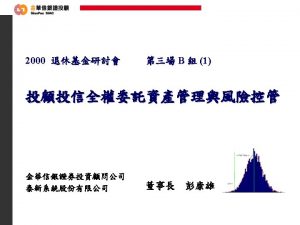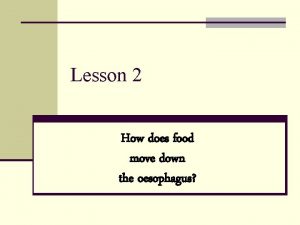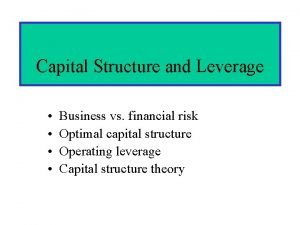RISK MANAGEMENT AND INSURANCE TOPIC 6 INSURANCE CONTRACTS





















- Slides: 21

RISK MANAGEMENT AND INSURANCE TOPIC 6 INSURANCE CONTRACTS

CONTRACT TERMINOLOGY • A CONTRACT is a legally binding agreement creating rights and duities for those who are parties to it. • If one party to the contract fails to perform its duties without a legal excuse, the contract is said to be BREACHED. • Courts can enforce thier judgements and settle contractual disputes.

Contract terminology contn’d… • A VALID CONTRACT is one court will enforce. • A VOIDABLE CONTRACT allows one party the option of breaking the agreement because of an act or omission of an act by the other party. • A VOID CONTRACT is one that a court will not enforce because from its begining it is leaked one or more features of a valid contract.

Binder • In property insurance, a temporary contract called a BINDER is often used before isssuance of the formal insurance policy. • The binder must meet all the requirements for a legal contract. • Valid for 30 days ot less. • Purpose is to provide coverage during the time it takes to process an application. • Can be oral or written. • Parol evidence rule : written agreement takes the precedence over oral agreement.

Conditional Receipt • Binders are not used in life insurance because life insurance agents lacks the authority to bind their companies. • Temporary coverage, however, contingent on an applicants ability to present evidence of insurability can be provided by a conditional receipt. • Coverage begins from the date of receipt.

Elements of a Valid Contract • Offer and Acceptance • Consideration • Capacity • Legal Purpose

Offer and Acceptance • Deals begin when one person makes a proposal to exchange something of value with another person. • The proposal to make an exchange is called OFFER. If the second person agrees to the exchange, this is ACCEPTANCE. • The offer must be reasonably definite and communicated clearly. • There must be meetings of the minds. • Insurer issues policy indicating an accpetance to an offer.

Consideration • The value exchanged between the parties to the contract is the consideration. • Consideration may take a tangible form such as money, or it may take the form of a promise to do something or not to do it. • There must be an exchange of consideration to have a valid contract.

Capacity • Not every person legally has the capacity to enter into a contract. • As a general rule, for reasons of social welfare, minors, the insane and the intoxicated can not enter into a binding agreement.

Legal Purpose • A Contract must have a legal purpose, an end or intention permitted by law. Contracts having an anti-social purpose are legally unenforceable. • An insurance policy purchased as a gamble on a famous person`s life or any life in which the contract owner has no legal interest is an example of an unenforceable contract.

DISTINGUISHING CHARACTERISTICS OF INSURANCE CONTRACTS 1. Principle of Indemnity 2. Subrogation 3. Contract of Adhesion 4. Representation 5. Concealment 6. Entire Contract 7. Incontestable Clause 8. The Aleatory Feature 9. Recession 10. Reformed

Principle of Indemnity • Principle of Indemnity: Ø Means the insured should be in the same financial position after as before the insured loss. • Exceptions to Principle of Indemnity Ø Life Insurance Ø Replacement-Cost Insurance Ø Valued Insurance Policies

Subrogation • Subrogation is the legal substitution of one person in another`s place. Ø eg. If a person must pay a debt for which another is liable, such payment should give the person a right to collect the debt from the liable party. • Subrogation is for the substitution of the insurer in place of the insured for the purpose of claiming indemnity from a third person for a loss covered by the insurance. • Purpose: Ø To prevent the insured from collecting twice from the same loss. Ø To hold the negligent person responsible for the loss. Ø To hold down insurance rates.

Contract of Adhesion • That is the unequal knowledge and unequal bargaining power are perceived to give the insurer a significant advantage over the insured, most states classify insurance contracts as contracts of adhesion (due to wording). • Adhesion Contracts: Preprinted contracts in which the adhering party has no opportunity to negotiate the terms of contract. Ø‘‘Standart-form’’ Ø‘‘Take-it-or-leave-it’’ ØBinding Arbitration

Representation • Before entering insurance contracts applicants are asked questions and if the consumer give false answers then the answers are material to the risk and the insurer can void the contract. Ø eg. ‘‘Any accidents in past 3 years? ’’ ‘‘No’’ - materiality-negative answer. • Representation is how something is presented. False representation is amisstatement of a material fact by the insured prior to the finalization of the contract.

Concealment • Concealment: Ø is silence when obliged to speak or a failure to disclose material information. Ø is the willingful failure to disclose pertinent information.

Entire Contract • Entire Contract Clause states that the insurance policy together with the attached application, constitute entire contract between the parties. • Any statement made by applicant for life insurance be attached to the policy. • Purposes: Ø Prevents the insurer from amneding the policy without the policyholder’s (insured’s) knowledge. Ø Protects the beneficiary. (Life and health insurance contcactural provision) • What does Insuring Clause mean? An insuring clause is a provision in an insurance policy that stipulates the risk coverage assumed by the insurer. In other words, it details the risks for which the insurer is liable and defines the scope of the coverage.

Incontestable Clause states that after the policy has been in force for a certain length of time, the company can no longer contest (deny) or void it except for nonpayment of premiums. For 1 -2 yeras, the insurer have time to discover any irregularities in the contract and have right to void the contract.

The Aleatory Feature • Aleatory feature means that the values exchanged by the contracting parties are not necessarily equal. • Due to the fact that the outcome of the contract depends on risk of wheather a loss will ocur, Ø Premium is the loss of the insured when there is no loss however, it is a gain for the insurer. (It’s gambling).

Recession • Recession means cancellation of contract. In that case, the original contract need not be performed. Both the contracting parties may agree, by mutual agreement, to rescind the contract by cancelling some or all terms of the contract. • It is agreement by both parties to end the contract.

Reformed • When the contract is needed to be written again due to typing mistakes.
 Market risk credit risk operational risk
Market risk credit risk operational risk Operational risk management wv
Operational risk management wv Wharton risk center
Wharton risk center Examples of clinchers
Examples of clinchers Narrow topic examples
Narrow topic examples Risk management in insurance
Risk management in insurance Key risk indicators for vendor management
Key risk indicators for vendor management Risk map
Risk map Many new drivers first fender bender is a backing collision
Many new drivers first fender bender is a backing collision Module 4 topic 1 assessing and managing risk
Module 4 topic 1 assessing and managing risk A muscular bag secretes gastric juice and mixes food around
A muscular bag secretes gastric juice and mixes food around Marsh risk and insurance services
Marsh risk and insurance services Residual risk and secondary risk pmp
Residual risk and secondary risk pmp Business risk vs financial risk capital structure
Business risk vs financial risk capital structure Relative risk calculation
Relative risk calculation Measure of association formula
Measure of association formula Features of fire insurance
Features of fire insurance Fed tapering
Fed tapering Research and development contracts
Research and development contracts Political risk insurance companies
Political risk insurance companies Yem mai marsh
Yem mai marsh Risk mitigation avoidance
Risk mitigation avoidance








































